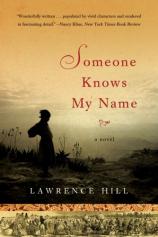Reading Group Guide
Discussion Questions
Someone Knows My Name

1. What is the significance of the title Someone Knows My Name?
2. What is your opinion about Hill’s suggestion that Aminata’s very youthfulness at the time of her abduction enables her emotional survival, even as some of the adults in her world show signs of crumbling?
3. The section of the book set in the sea islands of South Carolina depicts eighteenth-century indigo plantations where African American slaves and overseers are left largely to their own devices during the “sick season” --- a good half of the year. To what degree does this cultural and social isolation allow for an interesting development and interaction of African American characters in the novel?
4. Aminata suffers some horrifying cruelties at the hands of her captors, but her relationships with her masters aren’t always what you’d expect. How does Aminata’s story reveal the complex ways that people react to unnatural, unequal relationships?
5. During the course of the story, Aminata marries and has a family. Although she is separated from them, she is reunited from time to time with her husband and one of her children. What does the work tell us about the nature of love and loyalty?
6. Aminata struggles to learn and master all sorts of systems of communicating in the new world: black English, white English, and Gullah, as well as understanding the uses of European money and maps. How do her various coping mechanisms shed light on her character?
7. Aminata longs for her home. What is the meaning of home in the novel, and how does the meaning change as the novel progresses?
8. What does the novel tell us about survival? Which characters fare best and why?
9. As Aminata moves from slavery to freedom, she finds that freedom is sometimes an empty promise. At what points in the novel did you feel this was true? Did it change how you thought about the meaning of freedom?
10. Aminata is a woman of extraordinary abilities --- she is skillful with languages, literate, a speedy learner, a born negotiator. Why did Hill choose this story to be told by such a remarkable woman? What effect do her abilities have on the shaping of the story?
11. What do you think would be the challenges involved in writing a realistically painful novel that still offers enough light and hope to maintain the reader’s interest and spirit?
12. What lessons does Aminata’s tale hold for us in today’s world?
Readings of interest on the Web
http://www.bbc.co.uk/history/british/abolition/africa_article_01.shtml
On this BBC site, read “Africa and the Transatlantic Slave Trade,” an article by Dr. Hakim Adi, author and reader in the History of Africa and the African Diaspora at Middlesex University, London.
http://hitchcock.itc.virginia.edu/Slavery/index.php
Most of the more than 1,200 images in this collection date from the period of slavery. “The Atlantic Slave Trade and Slave Life in the Americas: A Visual Record” traces the experience of those who were sold into slavery in Africa and transported to the Americas, as well as that of their descendants.
http://pbs.org/wgbh/aia/part1/1p276.html
Read about Olaudah Equiano (1746–1797), who was sold into slavery at age eleven, eventually gained his freedom, and in 1789 wrote what was to become one of them most widely read slave autobiographies. Click “Equiano’s Autobiography” for the text.
http://lcweb2.loc.gov/ammem/aaohtml/
The U.S. Library of Congress presents its digital collection “African-American Odyssey,” which features more than 240 items relating to African American history, from the early days of slavery through the twentieth century: important and rare books, government documents, manuscripts, maps, musical scores, plays, films, and recordings.
http://www.library.northwestern.edu/govinfo/collections/mapsofafrica/
The Northwestern University Library of Illinois offers digital copies of 113 authentic, antique maps of Africa and accompanying text dating from the mid-sixteenth century to the early twentieth century.
http://blackloyalist.com/canadiandigitalcollection
“Black Loyalists: Our History, Our People” offers a wealth of historical detail in the form of personal accounts of Black Loyalists, letters, and other documents and proclamations, including the text of the original Book of Negroes. Click “Documents” on the main page.
Someone Knows My Name
- Publication Date: November 17, 2008
- Paperback: 486 pages
- Publisher: W. W. Norton & Company
- ISBN-10: 0393333094
- ISBN-13: 9780393333091







